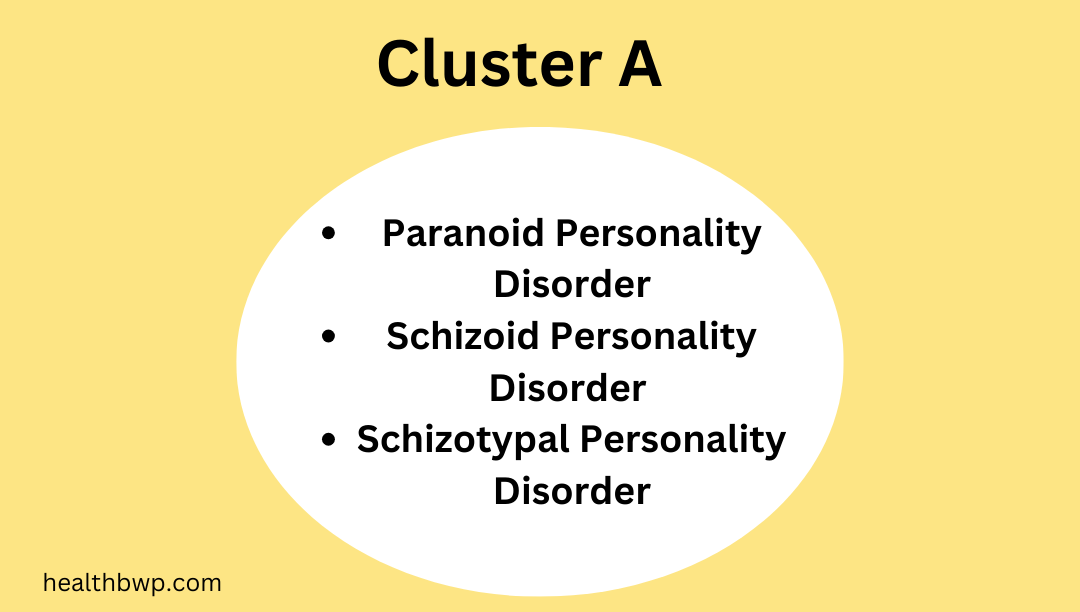Cluster A personality disorders are known as the odd, eccentric cluster. This cluster has personality disorders which are characterized by behavior that may be considered weird or odd in terms of societal view. Personality disorders included in Cluster A are:
- Paranoid Personality Disorder (PPD)
- Schizotypal Personality Disorder (STPD)
- Schizoid Personality Disorder (ScPD)
The common features seen in Cluster A Personality Disorders often manifest as pervasive social awkwardness, leading individuals to experience feelings of isolation and a tendency to withdraw from social interactions.
Traits of Cluster A
Cluster A personality disorders are a group of mental health conditions characterized by eccentric, distrustful, and detached behavior patterns. Individuals with these disorders may exhibit a tendency to be emotionally unavailable, making it challenging for them to connect with others on a deep emotional level. This emotional disconnect can lead to difficulties in forming and maintaining close relationships.
Grouping Schizophrenia and personality disorders are frequently linked; schizotypal personality disorder, in example, exhibits some of the same classic symptoms as schizophrenia, such as severe discomfort in intimate relationships, perceptual or cognitive abnormalities, and behavioral oddities. Those with odd-eccentric personality disorders, as opposed to those with schizophrenia, typically have a better understanding of reality.
These illnesses can make a person paranoid and make it difficult for others to understand them. They can also make a person unwilling to establish and maintain personal connections, as well as speak in strange or quirky ways. These anomalies are distinct from delusions or hallucinations, despite the fact that their perceptions may be peculiar; those who experience these would be diagnosed with other disorders.
Cluster A: Paranoid Personality Disorder
Paranoid Personality disorder is basically Paranoia. Paranoia is a complex psychological phenomenon that captivates the human mind, evoking a range of emotions and behaviors. Paranoid Personality Disorder or PPD is characterized by the constant lack of faith and distrust in people. Suffering from PPD makes you think like everyone around you is suspicious and not worthy to trust.
In simple words, being irrationally anxious or worried describes this personality disorder. People affected by PPD see others as a possible threat and that at any given moment people are ready to harm or humiliate them. That’s the reason people suffering from PPD don’t feel too comfortable in the company of others.
PPD is one of a group of conditions called Cluster A, or eccentric personality disorders. People who are diagnosed with these diseases frequently display thought patterns and behaviors that are viewed as unusual or strange by the general public.
Cluster A: Schizotypal Personality Disorder
Schizotypal Personality Disorder is one of a group of condition called “Cluster A” Personality Disorder which involves unusual and eccentric thinking and behaviors. Long term dysfunctional behaviors patterns which lead to social issues are called personality disorders. Patients of STPD may also misinterpret others’ motivations and behaviors and develop significant distrust of others. These problems may lead to severe anxiety and a tendency to avoid social situations.
A person suffering from Schizotypal Personality disorder or STPD may experience extreme discomfort with close relationships or any kind of social interactions. The person may be described as unsocial or eccentric due to their lack of interest in socializing with people. If a person is suffering with Schizotypal Personality Disorder they may have derealization of their surroundings, distorted views of reality and may engage in behaviors which can be considered odd or weird from a societal point of view.
Cluster A: Schizoid Personality Disorder
Schizoid personality disorder is one of a group of conditions called “Cluster A” personality disorders, which involve unusual and weird thinking or behaviors. Schizoid Personality Disorder or ScPD is a mental disorder which is identified by the lack of interest or avoidance of social interactions. People with this disorder may not want to participate in any kind of conversations with other people. People with Schizoid Personality Disorder also don’t show much emotions while interacting with others. Due to this, they can come off as ‘rude’ or ‘cold’.
People with ScPD might seem very distant and detached from reality. Their personality may come off as unnecessarily aloof or stoic. Those affected from Schizoid Personality Disorder may not even consider their behavior as problematic or weird/unusual.
What is a cluster personality trait?
“Odd” thinking and behavior, such as paranoia or a lack of emotional reactions, characterize Cluster A diseases. Unpredictable, dramatic, or extremely emotional reactions to situations are characteristics of Cluster B illnesses. The hallmarks of cluster C diseases include worried thoughts and actions.
What are the symptoms of cluster A?
1. like to spend time alone than with other people.
2. lack of desire to maintain friendships or family ties.
3. Absence of display of emotion.
4.dislikes things that other people find enjoyable
5. unable to recognize common social cues
What is the treatment of Cluster A?
Treatment for cluster A personality disorders, including paranoid, schizoid, and schizotypal, typically involves a multifaceted approach. Psychotherapy, particularly cognitive-behavioral therapy (CBT) and supportive therapy, is a cornerstone, focusing on identifying and modifying maladaptive thought patterns and behaviors.
Medication may be used to address co-occurring symptoms such as anxiety or depression, while supportive services like case management aid in accessing community resources. Group therapy and family therapy offer additional avenues for support and skill development.
Tailored to individual needs, treatment aims to enhance social functioning, manage symptoms, and foster healthier interpersonal relationships, recognizing the importance of building trust and rapport to facilitate therapeutic progress.
